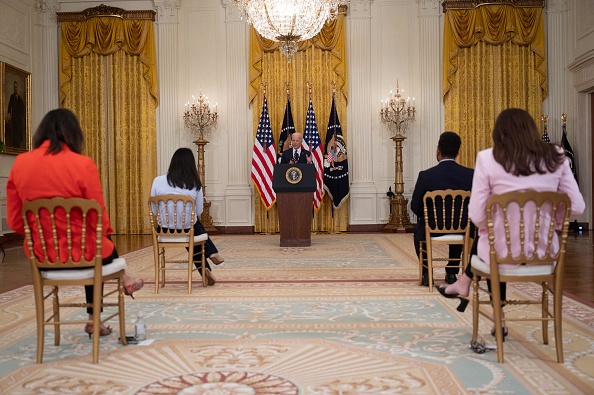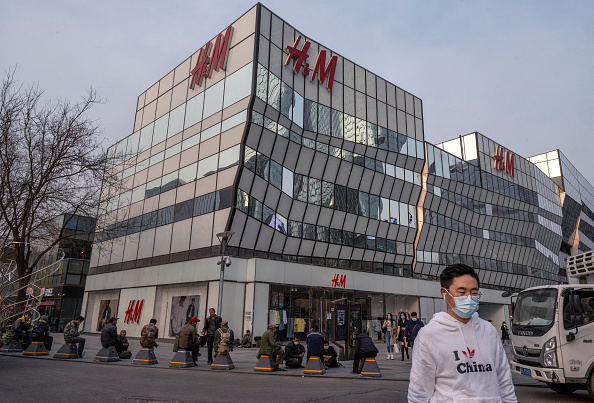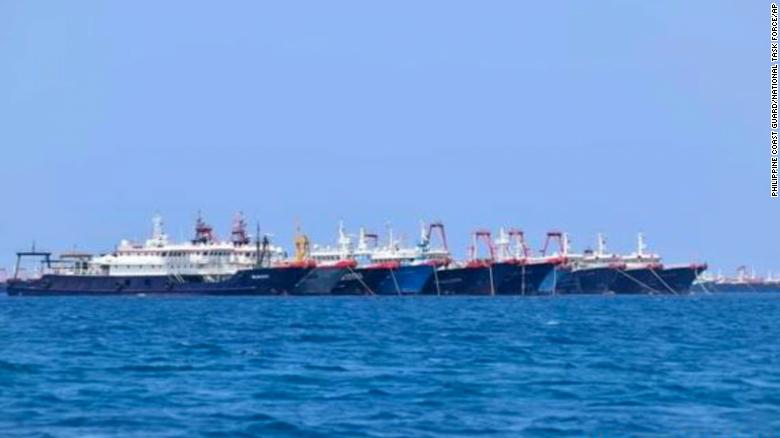
 The Biden Era
The Biden EraIn his first press conference as President, Joe Biden addressed challenges the United States faces from China amidst a changing international landscape. Outlining steps for the U.S. to take to rival China, Biden emphasized making strong investments and strengthening western alliances to "discuss the future" and "hold China accountable to follow the rules." Some experts are weary of western democracies' ability to coordinate a successful strategy to deter China. Bonnie Glaser, director of the China Power Project at the Center for Strategic and International Studies, noted that countries may not be in alignment on which issues to prioritize: "The grouping of countries that is willing to work with the U.S. on human rights, for example, may be different than the countries that will work together on Indo-Pacific security."
When asked about the fate of U.S. tariffs on China, Biden noted that while important, tariffs only captured a small portion of the tensions that exist between the two countries. Instead, Biden emphasized China's "overall goal to become the leading country in the world." He added: "That's not going to happen on my watch." Responding to President Biden's comments, Chinese Ambassador to the United States Cui Tiankai said that China's "goal is to meet the growing inspiration of the Chinese people for better life. Our goal is not to compete with, or replace, any other country."
Fallout from last week's rocky meeting in Anchorage is still being processed, with commentators on both sides unsure of how the two countries will proceed. After the televised meeting, however, Chinese and American officials were able to have a "substantive, serious and direct" conversation, signalling a potential for constructive dialogue in the future. Read more in A Hot Exchange in Cold Alaska, from David Shambaugh, Director of the China Policy Program at George Washington University
 Brand Boycott
Brand BoycottInternational retailers' concerns over forced labor allegations in Xinjiang reemerged this week, spurring Chinese netizens to call for a boycott. H&M, Nike, and Burberry are among the companies that have previously elucidated their position on the region and ensured that their materials are not sourced from Xinjiang cotton. Over the last week, H&M products have disappeared from Taobao, one of the largest online shopping websites in China, and several Chinese celebrities have terminated their contracts with the retailers.
The companies' statements resurfaced after the U.S., United Kingdom, European Union, and Canada jointly issued sanctions on Chinese officials for alleged human rights abuses earlier this week. The EU added 4 Chinese officials and a public security bureau to its sanctions list on Monday, which include travel bans and asset freezes, with the UK following suit shortly after. In response China placed sanctions on nine Britons and four British organizations, saying their actions severely undermine China-U.K. relations. China has also rejected all allegations and criticism of Xinjiang policies.
Some commentators worry the tit-for-tat sanctions may threaten China and the EU's newest investment deal, the Comprehensive Agreement on Investment. The deal, which was only signed last week, is seen to be a promising restart of cooperation between Brussels and Beijing, but recent tensions may throw a wrench into those plans. For more on the fate of the Comprehensive Agreement on Investment, read The EU-China Investment Deal May Be Anachronic in a Bifurcating World, from Alicia Garcia Herrero Senior Fellow at Bruegel, a European think tank specializing in economics.
 Stuck at Sea
Stuck at SeaVietnam and the Philippines have expressed concern over a growing number of boats in the disputed South China Sea, with the Philippines calling on China to withdraw the boats from the region. Philippine maritime officials reported over 200 Chinese fishing boats anchored side by side earlier this month at the Whitsun Reef, which Manilla calls the Julian Felipe Reef.
In a statement, Philippine Defence Minister Delfin Lorenzana said that the boats "[violate] our maritime rights and [encroach] into our sovereign territory," and referred to the 2016 South China Sea Arbitration, which ruled in favor of the Philippines regarding land reclamation activities in the maritime region. China has rejected that ruling.
According to China's foreign ministry spokeswoman Hua Chunying, the vessels were taking shelter near the reef due to inclement sea conditions. "I think this is very normal, and hope all sides can view this rationally," she added.
Prepared by China-US Focus editorial teams in Hong Kong and New York, this weekly newsletter offers you snap shots of latest trends and developments emerging from China every week, while adding a dose of historical perspective.
- 2021-03-19 “A Strong Smell of Gunpowder and Drama”
- 2021-03-12 Bridging the Divide
- 2021-03-05 A Tale of Two AI Superpowers
- 2021-02-26 Changing of the Guard
- 2021-02-20 Collective Approaches
- 2021-02-13 Hopes for a Bullish Year
- 2021-02-05 “The Most Serious Competitor”
- 2021-01-29 Looking Towards Multilateralism
- 2021-01-22 Biden’s China Path
- 2021-01-16 Becoming a "Technological Superpower"
- 2021-01-08 Capital Chaos
- 2020-12-18 All Eyes on 2021
- 2020-12-12 Midwest to Middle Kingdom?
- 2020-12-04 Shifting Winds
- 2020-11-21 Multilateralism on the Move
- 2020-11-14 Staying Tough
- 2020-11-07 Battleground Ballots
- 2020-10-30 Knock Knock